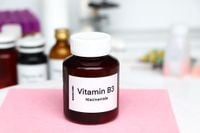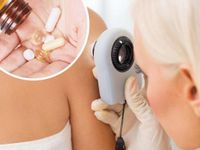In a significant development for dermatology and cancer prevention, a major cohort study published in JAMA Dermatology on September 17, 2025, has revealed that nicotinamide—a derivative of vitamin B3, also known as niacinamide—may substantially reduce the risk of developing skin cancer, particularly among individuals already diagnosed with nonmelanoma skin cancer. This finding arrives at a crucial time, as skin cancer rates continue to climb worldwide and clinicians search for more effective, accessible prevention strategies.
The research, led by Dr. Lee Wheless of Vanderbilt University Medical Center, analyzed data from a staggering 33,822 patients with a history of nonmelanoma skin cancer, drawing from electronic health records spanning from October 1999 to December 2024. The study’s design matched patients who took oral nicotinamide for at least 30 days after a skin cancer diagnosis with those who did not, controlling for variables such as age, number and timing of prior skin cancers, and other clinical and demographic factors. The mean age of participants hovered around 77 years, with a median of three prior skin cancers before starting nicotinamide. Notably, women comprised only 2% of the study population, and white patients made up 95%.
According to MedPage Today, the headline result was a 14% reduction in the overall rate of new nonmelanoma skin cancers among nicotinamide users, compared with those who did not take the supplement. The protective effect was even more striking—54% risk reduction—when nicotinamide was started immediately after a patient’s first skin cancer diagnosis. "We’ve known for years that the risk of new skin cancer increases with each subsequent skin cancer, but all of [the prior] studies had still been treating skin cancer history as a binary outcome," Dr. Wheless explained. "We instead matched on the number and timing of prior skin cancers and showed that patients experienced a greater benefit when starting nicotinamide after fewer skin cancers."
The study further broke down the types of skin cancers affected. Among all patients, nicotinamide use was associated with a 22% reduction in cutaneous squamous cell carcinoma (cSCC) rates, though there was no significant change in basal cell carcinoma (BCC) rates overall. However, for those who began nicotinamide after their first skin cancer, reductions were observed in both BCC and cSCC rates—about 50% for each. Patients who started nicotinamide after as many as seven skin cancers continued to benefit, though the magnitude of risk reduction diminished after that point.
Interestingly, the study found that nicotinamide did not significantly reduce skin cancer risk among solid-organ transplant recipients—a group known to be at particularly high risk for skin malignancies. Dr. Wheless commented on this, noting that a previous phase III trial in transplant recipients also failed to show benefit, though a subsequent smaller study had suggested otherwise. "While that study had a number of issues, it really led dermatologists to question whether [nicotinamide] was efficacious," he said. The current study’s much larger sample size allowed for more granular analyses, lending greater confidence to its findings for the general population.
Nicotinamide’s appeal as a chemopreventive agent lies in its pharmacological properties and accessibility. As JAMA Dermatology highlights, nicotinamide enhances the skin’s ability to repair ultraviolet (UV) light-induced DNA damage and reduces inflammation and immunosuppression—two key drivers of skin carcinogenesis. Unlike many other preventive medications, nicotinamide is available over the counter, has a low toxicity profile, and is inexpensive, making it an attractive candidate for widespread use, especially among high-risk individuals such as those with a history of actinic keratosis or prior skin cancers.
From a pathophysiological standpoint, skin cancer often arises from DNA photolesions caused by UV radiation, which can trigger mutations in critical genes. Nicotinamide helps repair this DNA damage and modulates the inflammatory environment that can facilitate malignant transformation. These mechanisms, according to the cohort study, underpin the observed reduction in new skin cancers among users.
The findings resonate with earlier research. A phase III randomized trial previously demonstrated fewer new skin cancers in patients taking nicotinamide twice daily, prompting many dermatologists to recommend the supplement for chemoprevention, especially in high-risk groups. A recent systematic review and meta-analysis of clinical trials, encompassing 552 patients, found a 50% reduction in skin cancer risk with nicotinamide use. However, prior studies were often criticized for being underpowered or failing to identify which patient subgroups would benefit most. The current retrospective cohort study, with its vast patient base and detailed matching, addresses many of those limitations.
Despite the promising results, Dr. Wheless and his colleagues urge caution. "We currently don’t have formal guidelines as to when to treat with nicotinamide, though in certain high-risk populations, such as those with field cancerization, it has been suggested to start after the second skin cancer or later," he told MedPage Today. "These results suggest that maybe we need to broaden the scope of who needs earlier intervention, while also providing some pretty strong evidence that nicotinamide is in fact effective at reducing the risk of skin cancer." He added, "For high-risk patients like organ transplant recipients or patients with clinical evidence of field cancerization but only one or two skin cancers, it makes sense to start nicotinamide earlier. For patients who do not have these high-risk features, it’s much harder to know at the outset who is going to develop lots more skin cancers and would benefit from nicotinamide versus who would not develop another skin cancer even without treatment."
Calls for further research remain. The authors emphasize the need for more prospective studies to confirm the chemopreventive benefits of nicotinamide and to better define which patient groups are most likely to gain from the intervention. The Editor in Chief of JAMA Dermatology, Dr. Kanade Shinkai, hailed the study as a vital contribution to the medical literature, noting that it will be featured prominently in upcoming journal media packages, including a podcast and video to help disseminate the findings to clinicians and the public alike.
For now, the study’s robust data suggest that integrating nicotinamide supplementation into standard care for patients with a history of skin cancer could reduce healthcare burdens and improve quality of life—especially when started earlier in the course of disease. As the medical community digests these findings, the hope is that this inexpensive, readily available vitamin could soon play a larger role in the fight against one of the world’s most common cancers.



